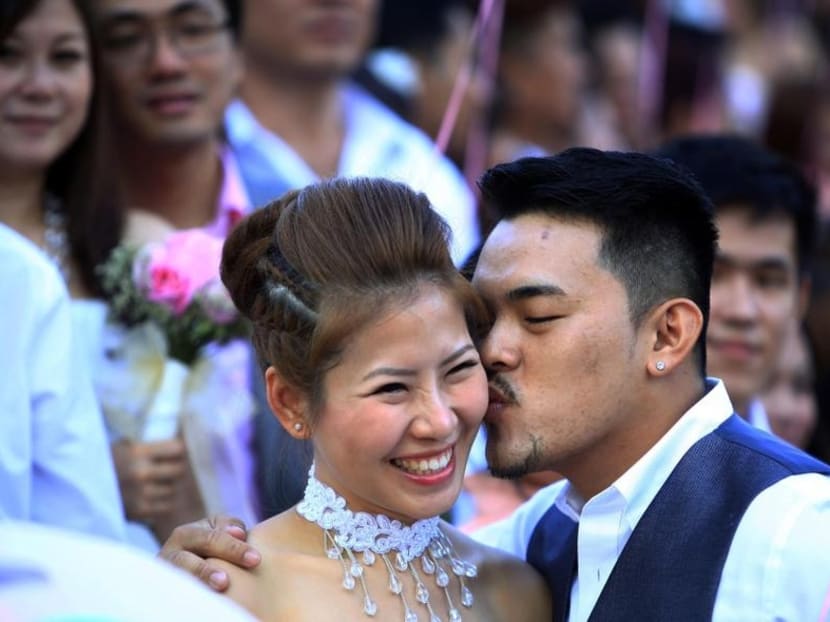Men at work, women at home is best recipe for high-income nation, says Malaysian group
KUALA LUMPUR — Malaysia can still be a high-income nation if its men remain the main breadwinners and its women focused on raising children, Islamist group Ikatan Muslimin Malaysia (Isma) argued amid concerns over the effect of youth marriages on the economy.

Dr Nur Farrah from Islamist group Ikatan Muslimin Malaysia also alleged that getting hitched early should be encouraged as a solution to social 'issues' such as sex or pregnancies out of wedlock. Photo: Reuters
KUALA LUMPUR — Malaysia can still be a high-income nation if its men remain the main breadwinners and its women focused on raising children, Islamist group Ikatan Muslimin Malaysia (Isma) argued amid concerns over the effect of youth marriages on the economy.
The group said while men can be “high achievers”, women should contribute to the nation in a way that “best suits them” instead of joining the workforce, although it did not elaborate on how to achieve that.
“A high income nation must not rely on women as the major contributor but rather men should lead the workforce and put their biggest effort in shaping the nation,” said Dr Nur Farrah Nadia Najib, who heads the group’s family and society bureau, on its website.
Citing the Wall Street Journal (WSJ), Dr Nur Farrah listed Japan as an example of a successful nation with low involvement of women in the workforce, making up about 40 per cent of the workforce and only 1.2 per cent of board members in major corporations.
However in September, WSJ reported that Japan’s Prime Minister Shinzo Abe is urging more women to join the East Asian country’s male-dominated workforce which is dwindling due to aging population, and is affecting Japan’s productivity and global competitiveness.
“We just need the right person for the right job. Our male counterparts actively involved in workforce and being high achievers,” she suggested.
“Our females need to be highly educated in various skills to bring up healthy, successful girls and boys and must contribute to the community in a way that best suits them.”
Dr Nur Farrah also alleged that getting hitched early should be encouraged as a solution to social “issues” such as sex or pregnancies out of wedlock.
“If these young adults get married early because of the issues that I have shared above, then it means getting married early is not a problem, it is a solution,” she claimed.
“A solution that is not ideal but needed to counter the mishaps of poor morality and social values. A more productive way is to study why the younger society is susceptible to all these issues and lend them a helping hand to find a brighter future.”
On Tuesday, United Nations Population Fund (UNFPA) representative for Malaysia, Michelle Gyles-McDonnough noted the overwhelming number of Malaysians getting married at a young age and got into family life before they were fully equipped physically and mentally to bear the responsibility.
She said that more than 150,000 Malaysians married too early, at age below 19, and compromised their ability to get an education and be part of a productive labour force in a high-income nation, and instead relegated themselves to a life of dependency and under-employment.
Child marriages are largely frowned upon in Malaysian society but do occur here as the country’s Islamic judicial system — which runs alongside the civil courts — has laws that allow a Muslim girl below the age of 16 to marry, though only with the consent of the Shariah Court. Permission is granted on a case-by-case basis.
This provision under Shariah law however is at odds with Section 376 of the Penal Code, which criminalises sex with a minor as statutory rape.
The Law Reform (Marriage and Divorce) Act — which applies to non-Muslims — allows for marriage between couples aged 18 and above, but exemptions are also made for girls aged 16 and above, whereupon the consent of the state’s chief minister or mentri besar, must be obtained first.
According to the population census in 2000, there were 11,400 children below 15 years of age who were married, of which 6,800 were girls and 4,600 boys.
Out of the 6,800 girls, 2,450 were Muslims, while 4,350 girls were non-Muslims comprising 1,550 bumiputeras; 1,600 Chinese; 600 Indians; and 600 other races. THE MALAY MAIL ONLINE






